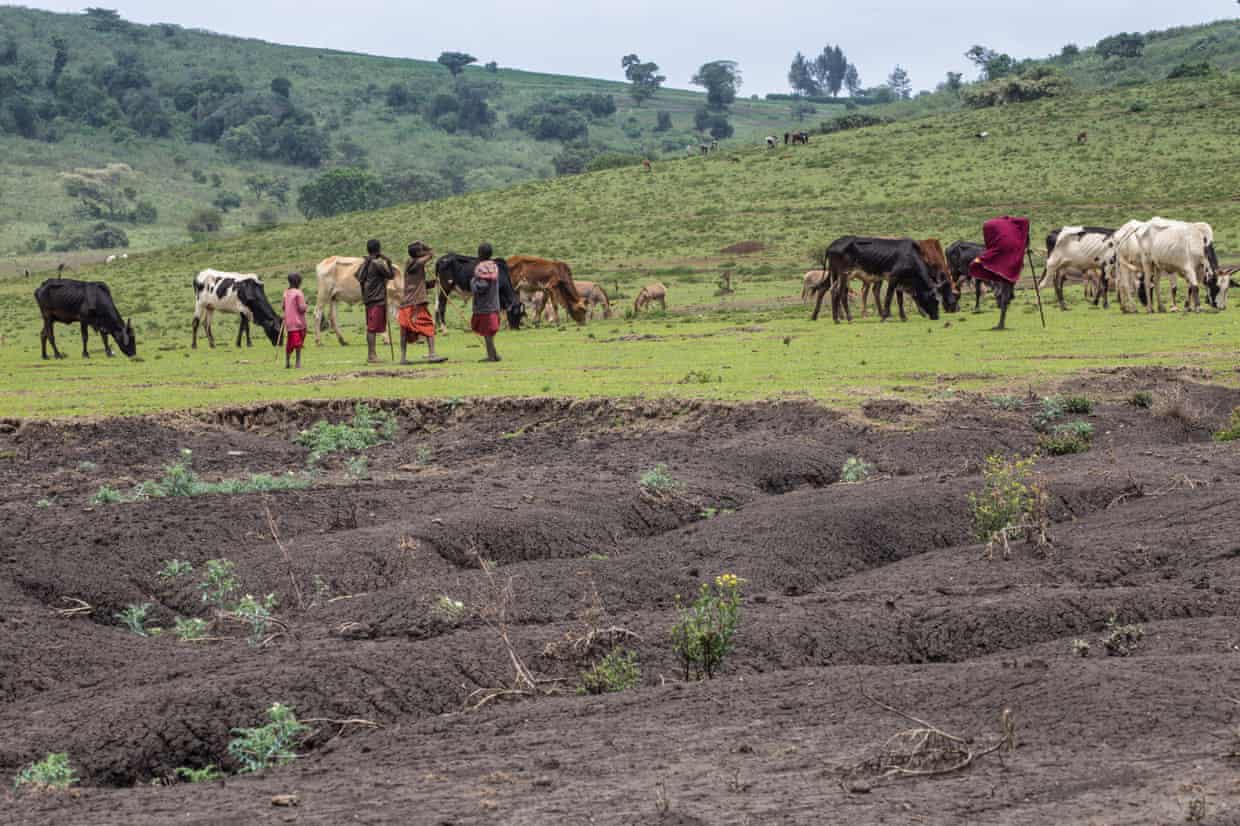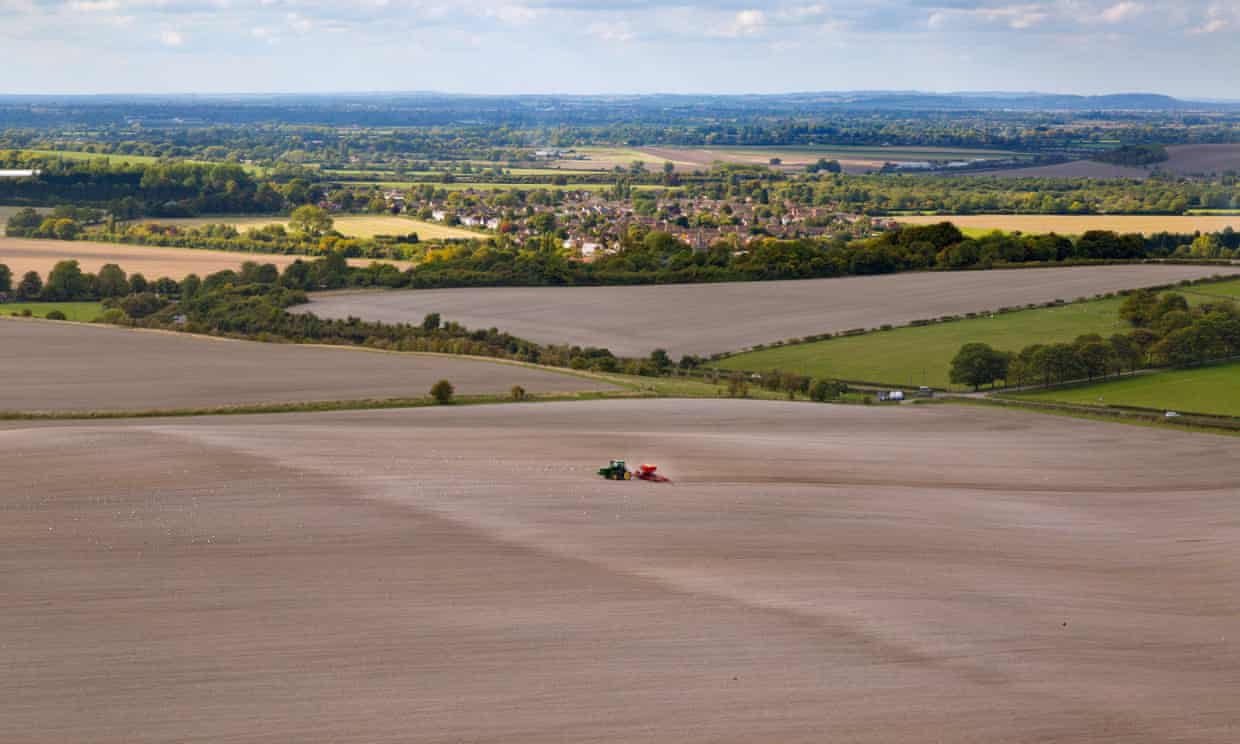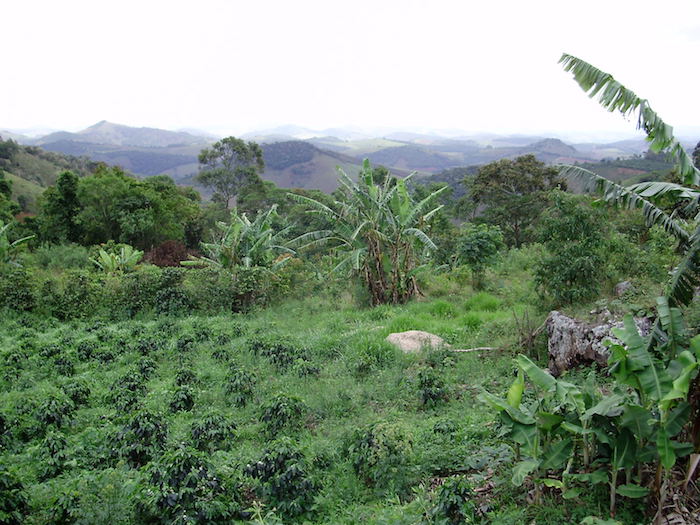The UK is 30 to 40 years away from “the fundamental eradication of
soil fertility” in parts of the country, the environment secretary Michael Gove has warned. “We have encouraged a type of farming which has damaged the earth,” Gove told the parliamentary launch of the Sustainable Soils Alliance
(SSA). “Countries can withstand coups d’état, wars and conflict, even
leaving the EU, but no country can withstand the loss of its soil and
fertility. If you have heavy machines churning the soil and impacting it, if
you drench it in chemicals that improve yields but in the long term
undercut the future fertility of that soil, you can increase yields year
on year but ultimately you really are cutting the ground away from
beneath your own feet. Farmers know that.”
We are no longer updating the Research Digest. All content remains.
The Permaculture Research Digest has summaries of newly published permaculture-related research. All items are
hyper-linked to the original publication.
The 'January 2013' archive contains 60 items published in 2012.
Items marked with a # have restricted public access, although abstracts are freely available.
Permaculture Research Digest
Monday, 30 October 2017
Designing bioregions (online)
Back To The Land 2.0
– A Design Agenda For Bioregions
What’s needed is a new story in which care for the places where we live is a practical focus for solidarity. In that spirit, a series of xskool workshops called Back To The Land 2.0 brought local actors together, in diverse locations, to flesh out this new story of place with live examples. The text in this article (it’s about 4,000 words, a 20 minute read) is about the lessons we have learned so far.
What’s needed is a new story in which care for the places where we live is a practical focus for solidarity. In that spirit, a series of xskool workshops called Back To The Land 2.0 brought local actors together, in diverse locations, to flesh out this new story of place with live examples. The text in this article (it’s about 4,000 words, a 20 minute read) is about the lessons we have learned so far.
UN report: 'soil in crisis' (online)
Third of Earth's soil is acutely degraded due to agriculture
A third of the planet’s land is severely degraded and fertile soil is being lost at the rate of 24bn tonnes a year, according to a new United Nations-backed study that calls for a shift away from destructively intensive agriculture. The alarming decline, which is forecast to continue as demand for food and productive land increases, will add to the risks of conflicts such as those seen in Sudan and Chad unless remedial actions are implemented, warns the institution behind the report.Certificate in holistic agroecology (course)
Crossfields Institute: Researching Holistic Approaches to Agroecology
Postgraduate Certificate (Hochschulzertifikat) leading to Masters
With this blended learning postgraduate course you study from home and in community with others.This course enables you to:- Develop an understanding of holistic approaches to the study of science, agriculture and agroecology
- Broaden your understanding of theory and practical application of agroecological initiatives
- Deepen your work in an area of your choice (such as biodynamics, permaculture, organics, urban agriculture etc.)
- Network and learn with others who share an interest in the future of our planet
- Carry out research in your own locale
- Communicate your findings widely
- Achieve a Postgraduate Degree
Transition research blog (online)
Transition Research Blog
The Transition Research Network have launched a new blog. Here you will find blog posts from active Transition researchers, telling you about their research. The first blogs are: 1) Researching the Geography of Transition, Dr. Giuseppe Feola, Reading University 2) Comparing the Resilience Alliance and Transition movement approaches to resilience My Sellberg, Stockholm Resilience Centre 3) Resilience, Community Action and Societal Transformation contributor interviews. A series of interviews with contributors to the first TRN book on the Transition Network website.Monday, 16 October 2017
Free e-book every month
New free e-book every month from The Univeristy of Chicago Press
Go to the offer page. Enter your e-mail address and click "Get E-book." You will receive an e-mail confirmation with a link to download your free e-book. Check back next month for another free e-book!
This month's book: Vegetables: A Biography, by Evelyne Bloch-Dano
Go to the offer page. Enter your e-mail address and click "Get E-book." You will receive an e-mail confirmation with a link to download your free e-book. Check back next month for another free e-book!
This month's book: Vegetables: A Biography, by Evelyne Bloch-Dano
Thursday, 12 October 2017
Agroecology as the future of global farming (online)
Perspectives: Agroecology as an alternative vision to Climate-smart Agriculture
Taken together, agroecology and food sovereignty represent an alternative paradigm to Climate-smart Agriculture and conventional development. This article focuses on the more transformative elements of agroecology and food sovereignty to clearly identify overlaps and divergences with Climate-smart Agriculture and highlight its incompatibilities with conventional development. It provides a fantastic introduction to one of the most important debates in contemporary agriculture.
Wednesday, 11 October 2017
Industrial food systems make us sick (report pdf)
Unravelling the Food-Health Nexus
NEW REPORT: 'An overwhelming case for action' - expert panel identifies unacceptable toll of food and farming systems on human health. Industrial food and farming systems are making people sick in a variety of ways, and are generating staggering human and economic costs - according to a major new report from the International Panel of Experts on Sustainable Food Systems (IPES-Food). Decisive action can be taken on the basis of what we know, the Panel found, but is held back by the unequal power of food system actors to set the terms of debate and to influence policy.
NEW REPORT: 'An overwhelming case for action' - expert panel identifies unacceptable toll of food and farming systems on human health. Industrial food and farming systems are making people sick in a variety of ways, and are generating staggering human and economic costs - according to a major new report from the International Panel of Experts on Sustainable Food Systems (IPES-Food). Decisive action can be taken on the basis of what we know, the Panel found, but is held back by the unequal power of food system actors to set the terms of debate and to influence policy.
Tuesday, 10 October 2017
Agroecology in Europe and Asia (report)
FAO organized the regional Symposium on Agroecology for Europe and Central Asia in Budapest from 23 to 25 November 2016, attended by over 180 participants from 41 countries. The Symposium participants formulated 37 recommendations to develop agroecology for sustainable food and agricultural systems in Europe and Central Asia (see Annex 1 of this report). This summary reflects the discussions among participants on the following five topics:
Agroecological concepts, systems and practices,
Research, innovation, knowledge sharing and agroecological movements,
Agroecology and natural resources in a changing climate: water, land, biodiversity and territories,
Agroecology and sustainable food systems,
Public policies to develop agroecology and promote transition.
Monday, 9 October 2017
The future potential of permaculture growing (report pdf)
THE POTENTIAL OF PERMACULTURE PRINCIPLES IN THE AGRIFOOD TRANSITION
The main question for this research was : How can a production system based on permaculture principles contribute to the agrifood transition? This study answered this question by comparing a permaculture system with a conventional potato system. The Unique Selling Points of permaculture were identified, which determine the future potential of permaculture. Due to its diversity and inherent social and ecological values, permaculture is expected to be able to respond well to future bioclimatic conditions and consumer demands, which conventional systems are less likely to excel in. The underlying ethics and principles foster resilience and flexibility and can be applied in any system, permaculture or not.
The main question for this research was : How can a production system based on permaculture principles contribute to the agrifood transition? This study answered this question by comparing a permaculture system with a conventional potato system. The Unique Selling Points of permaculture were identified, which determine the future potential of permaculture. Due to its diversity and inherent social and ecological values, permaculture is expected to be able to respond well to future bioclimatic conditions and consumer demands, which conventional systems are less likely to excel in. The underlying ethics and principles foster resilience and flexibility and can be applied in any system, permaculture or not.
Cover crops reduce weed seeds (online)
Cover Crops Increase Destruction of Weed Seed in Fields, Says Study
Cover crops have been promoted for their abilities to reduce erosion and retain soil nutrients. Now there is evidence that they can significantly reduce weed seeds. Crops such as red clover, planted after a main crop’s harvest, provide cover for insects such as ground beetles that feed on weed seed. Rodents are also important consumers of weed seeds and tend to prefer foraging under the shelter provided by cover. As a result, in fields planted with cover crops, three to four times more weed seed is eliminated.
Forest for Kids (book)
Forests for kids: Learning guide
This beautifully illustrated learning guide aims to introduce students aged 8–13 to the many aspects and roles of forests. It accompanies and complements the Forests for Kids teaching guide, tying in with curricula in the fields of science, geography and citizenship. Drawing inspiration from the internationally recognized enquiry method, the modules promote “learning by doing”, in classrooms or under the trees, although reading and writing exercises are also included.
Agricultural biodiversity and food sovereignty (journal)
Agricultural biodiversity is sustained in the framework of food sovereignty
There are between 30,000 and 50,000 edible plant species of which about 7000 have been cultivated. 7600 distinct breeds of livestock have been developed. Fishers harvest an estimated 1938 aquatic species. Forest dwellers have selected or developed thousands of tree and other species. Many species of edible fungi, insects, and other invertebrates are harvested. This Agricultural biodiversity is the product of the dynamic management of species and ecosystems, especially by smaller-scale food providers, their families and communities. Working with nature in the framework of food sovereignty, the intertwined actions by smaller-scale food providers in their dynamic management, production, innovation, resistance and protest, continue to give life to agricultural biodiversity.
Subscribe to:
Comments (Atom)


